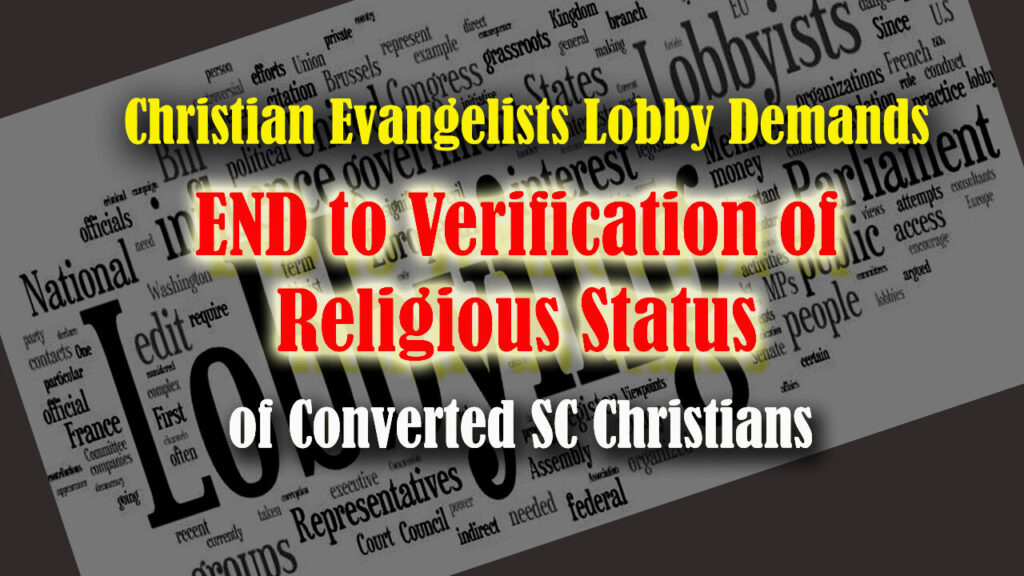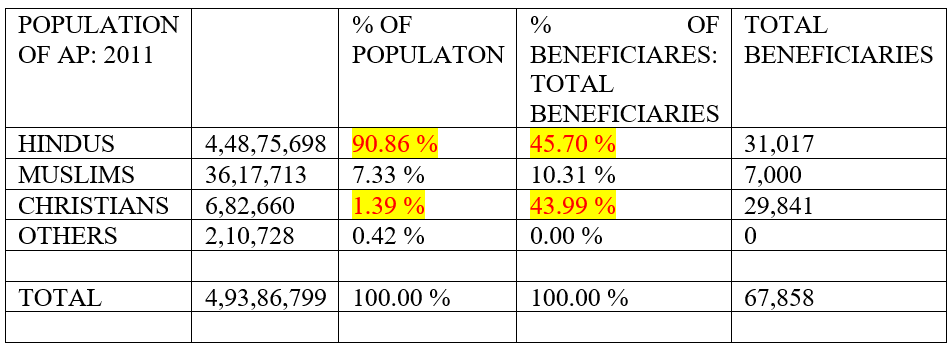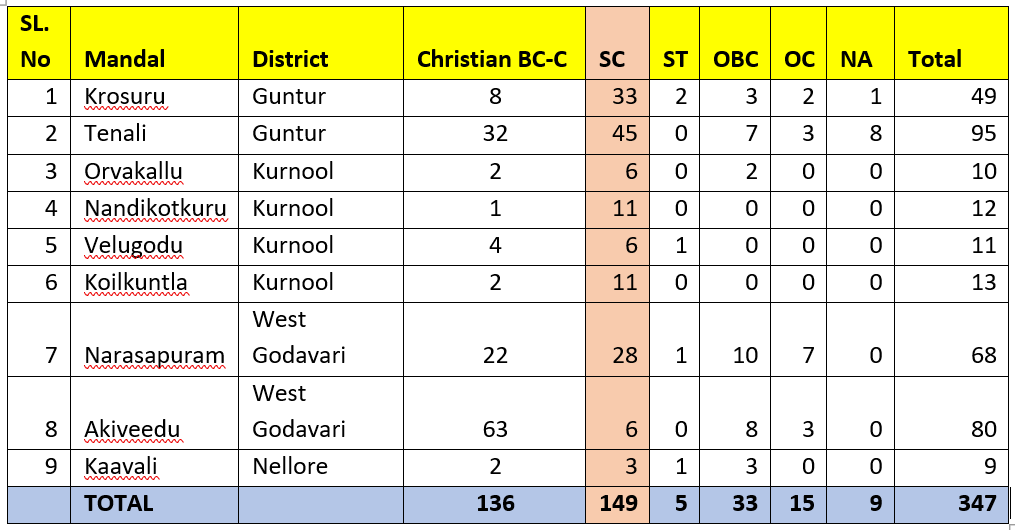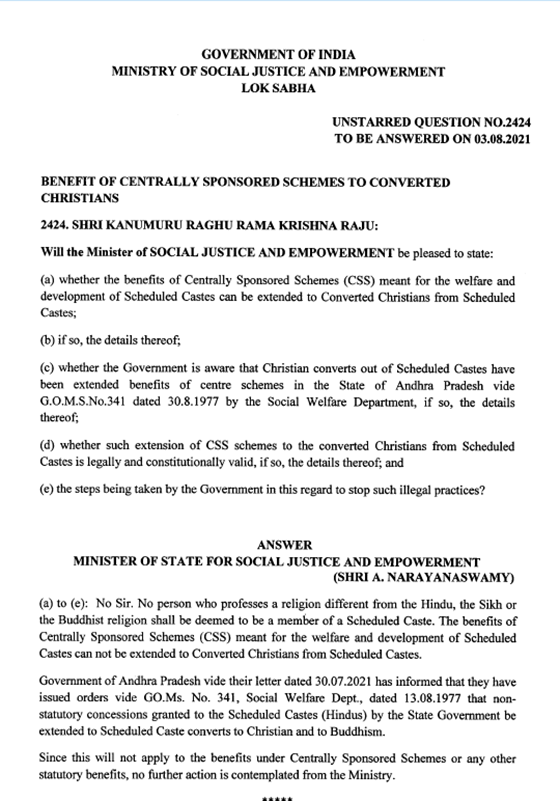
— K. Sahadev
Conversions from SCs into Christianity have taken place on a large scale in Andhra Pradesh. Officially (as per 2011 Census), there are 6.82 lakh Christians in Andhra Pradesh, while the actual number is estimated to be 80-90 lakhs. As SC converts to Christians lose their SC status, the evangelist lobby has started a state-wide campaign to abolish any verification of the religious status of SC while issuing Caste Certificates. They are encouraging SCs to practice a ‘Dual Religious Identity,’ i.e., Christian by faith and Hindu SC as per official records. This has severe implications for SCs in danger of losing their constitutionally mandated socio-economic benefits. A uniform and standardised pan-India procedure or law is urgently needed to safeguard SCs from the predatory tactics of the Christian Evangelist lobby. G.O. No 341 of 1977, allowing Christian converts from SCs to avail most of the benefits meant for SCs, should be declared unconstitutional and be scrapped.
AGITATION OVER 1998 MEMO OF GOVT OF ANDHRA PRADESH:
A circular memo issued in 1998 by the Andhra Pradesh Social Welfare Department to deal with complaints of conversion of Scheduled Caste into other religions has now kicked up a storm, and an agitation has been launched by a section of Christian evangelist lobby for scrapping the same. Though the circular has been in vogue for more than two decades, the row over the same has intensified. In speeches delivered by SC converts to Christianity, they claim that 80 lakh Dalits are now Christians in Andhra Pradesh, but after the BJP came to power, the memo is being increasingly made use of while dealing with complaints regarding conversion to Christianity or other religions by a person belonging to Scheduled Caste Community. However, several instances have come to light where Christian Pastors holding Hindu SC community certificates filed SC atrocity cases but in the process, they lost their Hindu SC certificate and ended up with BC-C community certificates. SC converts to Christianity in the states of Andhra Pradesh and Telangana are classified under the BC-C category.
The circular in question emphasizes ‘Local Spot Enquiry’ by officials to decide the religion practised by the applicant for the SC certificate. The officers are supposed to visit the residence of the person in question, study the religion practised at home, celebrate festivals, and make enquiries in the locality.
The issue is now hogging the limelight as the massive conversion of SCs in Andhra Pradesh into Christianity has become undeniable. The massive Christian religious infrastructure is in place across Andhra Pradesh in terms of churches, Christian prayer houses, and pastor training institutions. Several Christian pastors have adopted flamboyant and evident styles of conducting their prayer services. Huge meeting halls have been set up across the state. While the official population of Christians in Andhra Pradesh, as per the 2011 census, is 6,82,660, the actual figure could be in the region of 80 -90 lakhs.
Several villages report zero Christian population but have churches in double digits. The following information, collected through RTI, shows details of such villages.
RTI applications were filed with the appropriate authorities in the year 2019 in Reddygudem Mandal, Krishna district. The request was to provide the number of churches in the mandal, and the percentage of religious populations of Hindus, Christians and Muslims.
The Mandal Tahsildar of Reddygudem mandal furnished the following data:
No. of Churches in the mandal – 68
No. of villages in the mandal – 11
Therefore, average number of churches per village – 6
Note: As per 2011 Census the number of Christians in entire Reddygudem Mandal comprising of all 11 villages is – 630
According to reliable sources, when the Andhra Pradesh government announced payment of monthly honorarium to Christian religious workers, around 89,000 persons enrolled for the same. However, during Covid times, a one-time honorarium of Rs. 5,000 was paid to 29,841 Christian religious workers. This comes to one Christian religious worker for 22 Christians!
ANDHRA PRADESH: ONE-TIME PAYMENT FROM DISASTER RELIEF FUNDS TO RELIGIOUS SERVICE RENDERERS
RELIGION-WISE FIGURES OF BENEFICIARIES VIS-À-VIS STATE POPULATION

SUMMARY OF CHRISTIAN PASTOR BENEFICIARIES RELIGION / COMMUNITY-WISE:


However, data obtained through RTI on the religion/caste status of those Christian pastors revealed that 60-70 % of the pastors availing the honorarium had Hindu caste/ community certificates. The bulk of these pastors was from SC communities. Following this expose in various forums, the scheme of payment of monthly honorarium to Christian pastors was changed. This was necessitated by fear of loss of SC/OBC caste status. Pastors stayed away from applying for a monthly honorarium; hence, the scheme was changed from ‘Payment to Pastors’ to ‘payment to church’ so that official records would not have any information regarding the person receiving the payment. Under pressure from the evangelist lobby, these changes encourage a ‘Dual Religious Identity’ for Christian pastors. They can use their Christian identity to receive monthly honorariums while availing themselves of constitutionally guaranteed benefits meant for Scheduled Caste members using their Hindu-SC community certificates. The current agitation against verifying the religious status of Christian converts is meant to perpetuate this ‘dual religious identity’ – Christian in faith and daily life but Hindu in official records. This is fraught with danger as innocent SCs who have converted to Christianity are not aware that they will lose their SC status so long as they are Christians. The campaign by evangelist lobby against the 1998 memo will encourage ‘dual religious identity’ amongst SCs –Christian by faith but Hindu in official records. This is against the law of the land and will likely land innocent SCs in trouble.
Demographic trends revealed by successive population censuses for the last few decades have shown a peculiar trend, that of ‘vanishing Christians’ in Andhra Pradesh. With each successive census, the population of Christians has been decreasing while the population of Scheduled Castes has been increasing. The following table illustrates this phenomenon:

In December 2007, another circular memo was issued by the Social Welfare Dept., Govt. of AP, advising all district collectors to consider the following points while determining the religious and caste status of applicants for the issue of SC community certificates. This circular was issued primarily for numerically smaller communities included in the list of Scheduled Castes. The District Collectors were also asked to instruct the concerned Officers to conduct a discrete enquiry on the below aspects, satisfy themselves, and then only issue necessary orders within the prescribed time limit.
- Whether the applicant or his parents is or were practising the caste profession
- Whether the applicant or parents have suffered from untouchability.
- Whether the applicant is experiencing any social discrimination.
- Whether the applicant is interdining with another caste Hindus and participating in community lunch programmes regularly.
- Whether the rural artisans, especially those like Dhobi and Barbers, are attending to the family needs of the applicant.
- Funeral rites being observed by the applicant’s family
- Whether he is participating in the community, Social and Cultural Programmes along with others in the Village/Town
- Cultural and family habits/traditions of the applicant
In 1977, the Christian evangelist lobby achieved its first success in the erstwhile Andhra Pradesh. Following recommendations of the State Harijan Conference, the government of Andhra Pradesh extended certain benefits reserved exclusively for Scheduled Castes to Christian converts from Scheduled Castes. The government of Andhra Pradesh vide G.O.Ms.No.341, Social Welfare (PR) Department, dated: 30.08.1977, extended the benefits of various government schemes for the welfare of Scheduled Castes to Christians who have converted from Scheduled Castes.
This was achieved by classifying various benefits to Scheduled Castes into ‘statutory’ and ‘non-statutory’. This G.O. has arbitrarily restricted the benefits of reservation to SCs to just three areas:
- Admission to educational institutions
- Jobs in the government/public sector
- Contesting of elections from seats reserved for Scheduled Castes.
With the arbitrary and questionable division of SC benefits into statutory and non-statutory through G.O.No 341 dated 30th August 1977, SCs have lost a bulk of their benefits in terms of housing, land allotment, concession loans and other SC sub-plan benefits to Christian converts. After the formation of the Telangana state in 2014, the Government of Telangana has confirmed the operation of the above-referred G.O. of 1977 in the newly formed state through G.O. of SCHEDULED CASTE DEVELOPMENT (SCP) DEPARTMENT G.O.MS.No.25 Dated.20.12.2014.
On 3rd August 2021, while replying to a parliamentary question on the benefits of Centrally Sponsored Schemes for Converted Christians from Hindu SC castes, the Minister for Social Justice and empowerment, Sri A. Naryayanaswamy, replied that schemes being implemented for the benefit of SCs cannot be extended to converted Christians from SC communities. Text of the question submitted by Lok Sabha MP Sri. K. Raghurama Krishna Raju and the minister’s reply are shown below.

As seen from the above parliamentary question, the scope of the question was restricted to Centrally Sponsored Schemes. However, the same constitutional clauses and provisions of THE CONSTITUTION (SCHEDULED CASTES) ORDER, 1950, promulgated by the President of India, apply to all schemes designed for the benefit of Scheduled Castes. There cannot be separate rules for Centrally Sponsored Schemes and state-specific schemes. The arbitrary division of benefits meant exclusively for Scheduled Castes into statutory and non-statutory benefits by a state government executive order needs severe legal scrutiny. If found to be unconstitutional, the G.O. concerned needs to be scrapped.
Thus the well-organised Christian – Evangelist lobby has started a state-wide agitation programme calling upon SC-converted Christians to exert pressure on political parties to demand the scrapping of the G.O. issued to deal with complaints of conversion of SCs into Christianity. They have no respect or regard for provisions of the Constitution of India or Presidential Order,1950, governing constitutional safeguards/ reservations for Scheduled Castes. The Supreme Court of India has consistently held that when a person converts from Hinduism to a religion not having a caste system, the caste of the person is deemed to be under eclipse, and the same cannot be used for till he or she re-converts to the Hindu religion. The ‘doctrine of eclipse’ was first enunciated in the case of KAILASH SONKAR Vs. MAYA DEVI
( DATE OF JUDGMENT16/12/1983, BENCH: FAZALALI, SYED MURTAZA CITATION: 1984 AIR 600 1984 SCR (2) 176 , 1984 SCC (2) 91 1983 SCALE (2)1211, CITATION INFO: R 1984 SC1260 (16) )
The above judgement was cited in several subsequent cases by several high courts and by the Supreme Court of India in the case of CIVIL APPEAL NO. 4870 OF 2015, Mohammad Sadique (Appellant) Versus Darbara Singh Guru (Respondent). The 1983 judgement of Supreme Court held as follows:
“In our opinion, when a person is converted to Christianity or some other religion the original caste remains under eclipse and as soon as during his/her lifetime the person is reconverted to the original religion the eclipse disappears and the caste automatically revives”
Mass mobilisation using sheer numbers to create a vote bank and pressure groups to defeat the law of the land is an unwelcome development that must be dealt with severely. Those leading the agitation on this issue are conducting meetings, rallies and making open demands on all political parties that they should declare the scrapping of the Circular Memo of 1998 as an election promise.
Scheduled Castes of Andhra Pradesh and Telangana are victims of the Christian-Evangelist lobby and their machinations. With the arbitrary and questionable division of their benefits into statutory and non-statutory through G.O.No 341 dated 30th August 1977, they have lost a bulk of their benefits in terms of housing, land allotment, concession loans and other SC sub-plan benefits to Christian converts. The Circular Memo of 1998 has only been used in the last two decades in a handful of instances.
The Christian Evangelist lobby, which has the benefits of SCs as its last priority, has taken up cudgels against this memo as it feels that this memo acts as a disincentive for converting more and more SCs into Christianity. At the same time, those SCs who have already converted to Christianity are contemplating reverting to their ancestral faith lest they lose their SC caste status through the application of the Circular Memo of 1998. Having reached near saturation levels in converting SCs to Christianity, the evangelist lobby from Andhra Pradesh is now spreading out to neighbouring Chattisgarh, Orissa and Maharastra states. Evangelists from Andhra Pradesh are active in several states like Bihar and Punjab. They also run several prayer houses in the Persian Gulf, where a sizeable diaspora of the Telugu-speaking population works as migrant workers. Through this agitation, they want to clear hurdles for implementing their conversion plans on a pan-India basis.
In view of clear cut judgements from the highest court of the country, provisions of Constitution of India to safeguard benefits for social and economic upliftment of Scheduled Castes, the efforts of the Christian-Evangelist lobby are clearly against the law of the land and interests of Scheduled Castes. There is an urgent need to lay down a uniform procedure to deal with conversion /reconversion of citizens of India from one religion to another. While the Constitution of India guarantees the fundamental right to profess the religion of one’s choice, a person exercising this fundamental right should be ready to comply with other provisions of the Constitution, the law of the land and various executive orders. He or she should declare his change of religion to the concerned authorities and obtain the relevant religion/community certificates.
If necessary, a new law must be enacted by the nation’s Parliament, clearly defining who is a Hindu or Christian and when a person is deemed to have converted to Christianity or vice-versa. Even the Freedom of Religion Acts passed in a few states do not consider this issue. This issue impacts the lives of crores of Scheduled Caste members across the country, and it is too severe to be left to be decided by courts or regulated through executive orders. This lacuna should be immediately attended to lest the interests of Scheduled Castes be sacrificed at the altar of vote bank politics.

More Stories
‘Tippu NijaSwarupam’ Book Launch event organised in Hyderabad
Muslim cleric from AP calls for assassination of PM Modi and Amit Shah
Kerala Church Rebels Against New Worship Method Mandated by Pope